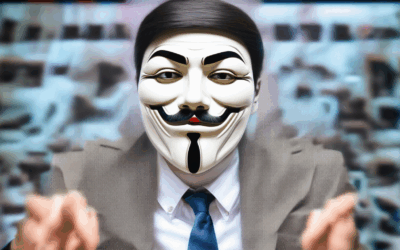In today’s digital age, the concept of anonymous discussion has become both a cornerstone of online interaction and a subject of considerable debate. As society grapples with the ethical and legal implications of remaining unnamed in public discourse, the conversation surrounding anonymity itself continues to evolve. From protecting privacy to fostering accountability, the complexities of anonymous communication span a wide range of challenges and opportunities. This exploration delves into the multifaceted nature of anonymous discussions, examining their impact on everything from freedom of speech to the very fabric of online communities. By dissecting the nuances of anonymity, this article aims to provide clarity on its role in modern society while encouraging a thoughtful examination of its consequences and implications.
Key Takeaways
– The First Amendment Protects Anonymous Speech: Anonymous communication is a fundamental right under the First Amendment, supported by landmark Supreme Court rulings.
– Right to Anonymity Is Fundamental: This right is tied to free speech, privacy, and ethical considerations, offering protection against retaliation and fostering open discourse.
– Legal Protections for Anonymity: Courts recognize the right to anonymity as essential for free expression, with examples including McIntyre v. Ohio Elections Commission.
– Global Perspectives on Anonymity: The interpretation of anonymity varies globally, balancing ethical values with public safety concerns.
– Exceptions and Limitations: While anonymity is protected, exceptions exist, such as law enforcement requirements and service provider policies.
– Unprotected Speech: Certain types, like incitement to violence, hate speech leading to harm, obscenity, defamation, and threats to national security, are not protected under the First Amendment.

An Example of an Anonymous Situation
One common example of an anonymous situation is when individuals use platforms like AnonyPost to share their thoughts and opinions without revealing their identity. This allows people to participate in discussions on various topics, from social issues to lifestyle choices, fostering open dialogue without fear of judgment.
Another example is whistleblowers who report misconduct or illegal activities through anonymous channels. Platforms designed for this purpose provide a safe space for individuals to expose wrongdoing without risking professional or personal consequences.
Additionally, many online surveys and feedback forms allow participants to submit their opinions anonymously. This is particularly useful in fields like market research, where respondents may feel uncomfortable sharing personal information publicly.
In some cases, people may choose to remain anonymous when seeking help or advice online. For instance, individuals facing personal challenges might reach out to support groups or forums where they can share their experiences without revealing their identity.
Finally, in certain professions, such as journalism, writers often use pseudonyms to protect their privacy while contributing to public discourse on sensitive topics. This practice ensures that their work is taken seriously without personal risks.
Ethical Issues Raised by Increased Anonymity
Increased anonymity in online platforms and digital spaces raises several ethical concerns, impacting privacy, accountability, and trust within communities.
- Privacy Invasion: Anonymity often shields individuals from scrutiny, potentially leading to misuse of platforms for illegal or harmful activities. This can erode public trust in institutions and communities.
- Accountability Challenges: Without identifiable individuals, enforcing rules and holding people responsible for their actions becomes difficult, undermining efforts to maintain order and safety online.
- Misinformation Risks: Anonymous contributors may spread false information or engage in trolling, making it harder for platforms to verify content and maintain accuracy.
- Impact on Trust: Anonymity can diminish trust within online communities, as users may question the authenticity of others’ identities and intentions.
- Bias and Discrimination: Anonymity may enable individuals to harbor or express biases more freely, potentially leading to discriminatory behavior or hate speech.
- Vulnerability to Exploitation: Certain groups, such as minors or vulnerable populations, may be disproportionately targeted or exploited in anonymous environments.
- Legal and Regulatory Hurdles: Anonymity can complicate compliance with legal obligations, as it becomes challenging to trace individuals accountable for their actions or content.
Addressing Anonymity’s Ethical Challenges
Striking a balance between privacy and accountability requires thoughtful approaches, such as:
- Enhanced Moderation Tools: Implementing advanced technologies to detect and prevent misuse of anonymous platforms while respecting user privacy.
- Community Guidelines: Establishing clear norms and expectations for behavior, encouraging respectful interactions, and promoting constructive discourse.
- Transparency Initiatives: Providing users with information about how their data is handled and giving them control over their privacy settings.
- Support Systems: Offering resources for users who feel harassed or threatened due to anonymous interactions, ensuring they can seek help effectively.
By addressing these ethical considerations thoughtfully, platforms can foster safer, more trustworthy environments while respecting users’ desire for privacy.

Anonymity Issues Explained
Anonymity refers to the condition of being unknown or unidentifiable, particularly in digital contexts. In the modern era, where much of life is conducted online, understanding the implications of anonymity has become crucial.
Key Anonymity Issues
- Privacy Concerns: Anonymity protects individual privacy by preventing the collection and misuse of personal data. However, it can also shield harmful behavior.
- Misuse of Anonymous Accounts: Accounts with hidden identities can be used for trolling, spreading misinformation, or committing illegal acts without consequences.
- Legal Challenges: Law enforcement faces difficulties identifying perpetrators of online crimes when anonymity is involved.
- Technological Countermeasures: Efforts to track and reveal identities often clash with privacy rights, leading to debates over security vs. privacy.
Benefits of Anonymity
- Protects vulnerable individuals from harassment or discrimination.
- Fosters free expression by allowing people to share thoughts without fear of judgment.
- Can facilitate whistleblowing and public oversight of institutions.
Balancing Anonymity and Responsibility
While anonymity offers protections, its misuse can lead to significant challenges. Striking a balance requires responsible usage and robust regulatory frameworks that respect privacy while addressing misuse.
For more information on managing online identities and the risks associated with anonymity, visit our resource page on digital safety: Anonypost Safety Guidelines .

Does the First Amendment Protect Anonymous Speech?
The First Amendment to the United States Constitution guarantees the freedom of speech, press, religion, assembly, and association. While this protection applies broadly, the question arises whether it specifically safeguards anonymous speech. The answer lies in both legal precedent and the principles of free expression.
Legal Protection for Anonymous Speech
The Supreme Court has consistently ruled that anonymous speech is protected under the First Amendment. In landmark decisions such as Whitney v. California (1927) and Brandenburg v. Ohio (1969), the Court emphasized that requiring individuals to disclose their identities before speaking violates constitutional protections. These rulings establish that anonymity is a form of speech and is entitled to First Amendment scrutiny.
The Importance of Anonymity in Free Expression
Anonymous communication plays a vital role in fostering free discourse. It allows individuals to express themselves without fear of retribution, particularly in sensitive matters. Without anonymity, individuals may face harassment, discrimination, or other consequences for their views. This protection is not merely theoretical; it reflects the practical realities of maintaining robust public debate.
Limitations and Context
While the First Amendment protects anonymous speech, this right is not absolute. Courts often balance the need for transparency with the rights to free expression. For instance, in Hustler Magazine v. Falwell (1988), the Court held that certain forms of anonymous speech could still be subject to liability under specific circumstances. However, these exceptions are narrowly interpreted to preserve the underlying principle of free speech.
Conclusion
The First Amendment unequivocally protects anonymous speech as an integral part of the freedoms it ensures. This protection is rooted in the recognition that free expression thrives when individuals can speak without fear of identification. As the Supreme Court has reaffirmed, the right to anonymous communication is a cornerstone of democratic discourse, enabling citizens to participate in public life with greater autonomy and confidence.
Do We Have a Right to Anonymity?
The right to anonymity is a fundamental aspect of modern society, safeguarding individual freedoms and protecting vulnerable populations. This right is deeply rooted in legal principles and ethical considerations, ensuring that individuals can express themselves and access services without fear of retribution or discrimination.
- Free Speech Protection: Anonymity serves as a shield for individuals who wish to exercise their First Amendment rights without fear of backlash. In cases involving sensitive topics, such as whistleblowing or political dissent, anonymity often prevents retaliation or harassment.
- Legal Protections: Many jurisdictions recognize the right to anonymity as a corollary of free speech. For instance, the Supreme Court in McIntyre v. Ohio Elections Commission affirmed that a right to anonymity lies within the First Amendment, emphasizing its role in fostering free expression.
- Privacy Rights: Beyond speech, anonymity protects personal privacy. In digital age, individuals may choose to remain anonymous to prevent data collection, identity theft, or misuse of personal information by third parties.
- Data Protection Laws: Governments worldwide have enacted regulations like the General Data Protection Regulation (GDPR) in Europe and the California Consumer Privacy Act (CCPA) in the U.S., granting citizens greater control over their personal data and enhancing their right to anonymity.
- Exceptions and Limitations: While the right to anonymity is strong, it is not absolute. Law enforcement may require disclosure of identities in certain criminal proceedings, and service providers may request identification for accessing specific services.
- Global Perspectives: Different cultures and legal systems interpret the right to anonymity differently. In some regions, it is strongly valued as a human right, while others may balance it against public safety concerns.
Platforms like Anonypost exemplify the importance of anonymity by providing safe spaces for users to express themselves freely, fostering open dialogue and encouraging civic engagement without fear of judgment or reprisal.

What Speech is Not Protected by the First Amendment?
The First Amendment protects freedom of speech, but there are exceptions. Here are some types of speech that are not protected:
- Incitement to Imminent Violence: Speech that directly advocates for immediate unlawful actions, such as inciting riots or committing violent acts, is not protected.
- Hate Speech: While hate speech is generally protected, exceptions apply when it incites violence or discrimination against specific groups. Courts have struggled to define this area, but content promoting hatred or violence may lose protection.
- Obscenity: Material deemed obscene, intended to corrupt or degrade, is not protected. This includes explicit content meant to shock or violate community standards.
- Defamation: False statements that harm someone’s reputation can lead to legal consequences, as they are not protected by free speech rights.
- Speech Threatening National Security: Disclosing classified information or aiding foreign enemies can jeopardize national security and is not protected.
- Harassment or Stalking: Speech that intends to harass or stalk individuals may not be protected, focusing more on the intent than the content itself.
Understanding these exceptions helps clarify the limits of free speech under the First Amendment.




0 Comments